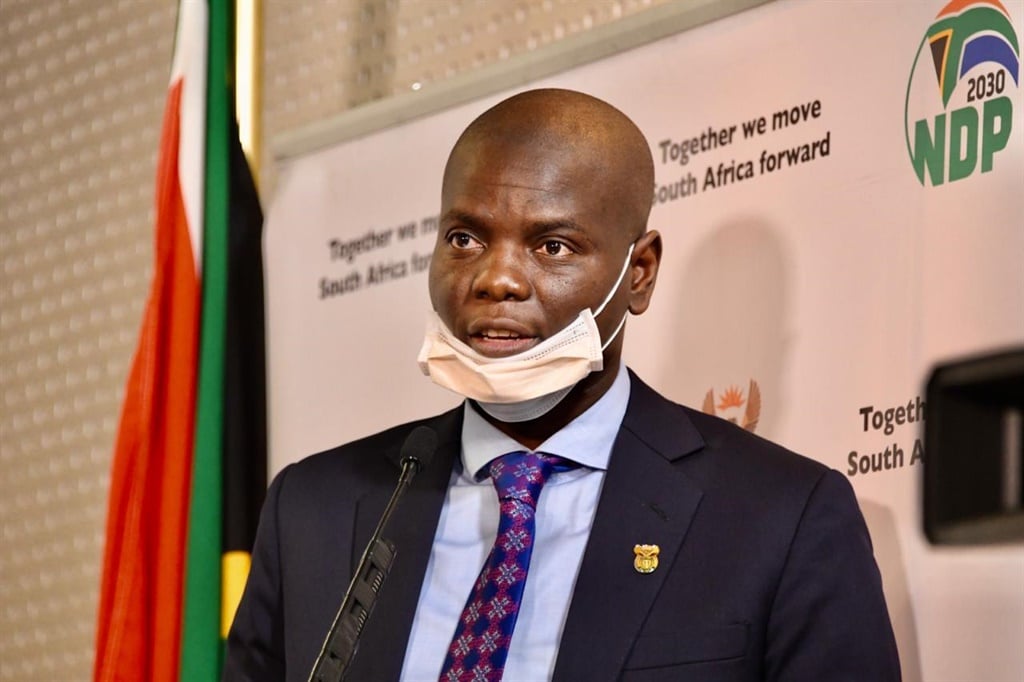


Minister of Justice and Correctional Development, Ronald Lamola.
- Justice Minister Ronald Lamola said the lockdown regulations are “rationally connected” to curbing the pandemic.
- DA MP Glynnis Breytenbach accused Lamola of turning citizens into criminals by endorsing draconian regulations.
- MPs are concerned about the NPA’s resources and its lack of prosecutions.
The lockdown regulations are “rationally connected” to curbing the Covid-19 pandemic, Justice Minister Ronald Lamola said.
The minister was responding to sharp criticism from DA MP Glynnis Breytenbach, who accused him of “bleating like a lamb after the autocrats around him” on the National Coronavirus Command Council (NCCC).
Lamola presented the Department of Justice and Constitutional Development’s adjusted budget to a mini plenary of the National Assembly in a virtual sitting on Thursday.
ALSO READ | Decision to criminalise the non-wearing of masks not an easy one – Lamola
Breytenbach referred to Lamola’s first budget vote speech last year, when he assured the house of his commitment to the Constitution and the rule of law.
“But, just a few months later, while announcing more draconian lockdown regulations, Minister Lamola proudly proclaimed that the government does not have to consult the public extensively on the regulations governing South Africa’s lockdown despite the implications they might have on the citizenry, and proclaimed himself to be the custodian of the Bill of Rights,” Breytenbach said.
“Given the opportunity to step up and provide leadership in the questionable National Covid Command Council, the minister has failed dismally to do so, bleating like a lamb after the autocrats around him.
“He has not uttered one word about the excesses of the securocrats around him and is clearly happy to turn citizens into criminals by endorsing draconian lockdown regulations, with no regard for reality or the resultant misery”.
Context
Responding to the debate, Lamola said: “Cabinet always ensures that regulations are rationally connected to the intended objective of Covid-19. They are done in that context”.
He said there isn’t a legal requirement to have consultations, and there has been a court judgment to this effect.
“Cabinet has gone out of its way to do consultations, even sometimes post facto.
“We have been consulting on various regulations”.
A general concern raised in the debate was the lack of high-profile corruption prosecutions by the National Prosecuting Authority (NPA) and the resourcing of it and the other entities in the sector.
“The NPA remains bogged down in the mess left after state capture and will never be able to function at the level required while it remains under-resourced,” said Breytenbach, a former senior prosecutor.
She doesn’t support the adjusted budget, which, according to her, has “all the innovative qualities of an amoeba”.
‘Money where your mouth is’
In his response, Lamola said they will “put their money where their mouth is” in terms of the fight against corruption.
In his speech, Lamola said the fight against corruption “undoubtedly requires us to have strong state institutions, which have both technological and human resources capacity”.
“State institutions, like the National Prosecuting Authority, must have the capability to tackle any case in which valuable resources of this great nation have been diverted for the benefit of individuals at the expense of our society, especially the poor.
“If individuals in positions of authority and great responsibility derail our path to social justice by stealing that which was intended to reconstruct South Africa, our justice system must be able to respond adequately, with certainty and with celerity”.
He said corruption, white-collar and commercial crime remain a challenge in the public and private sector, directly affecting the state’s ability to deliver services to the poor and vulnerable.
“We are working to rebuild the NPA to be an effective, efficient and ethical prosecutorial organisation that prosecutes without fear, favour or prejudice”.
He claimed that the “fight against corruption was intensified systematically” during the past year, and outlined some of the steps that were taken.

